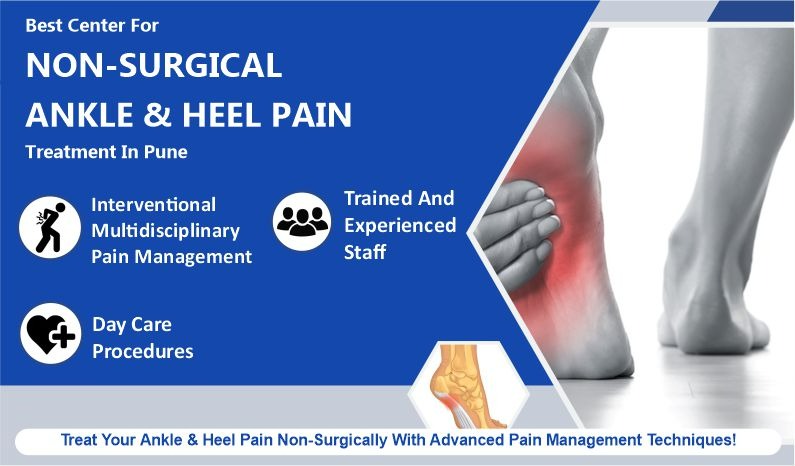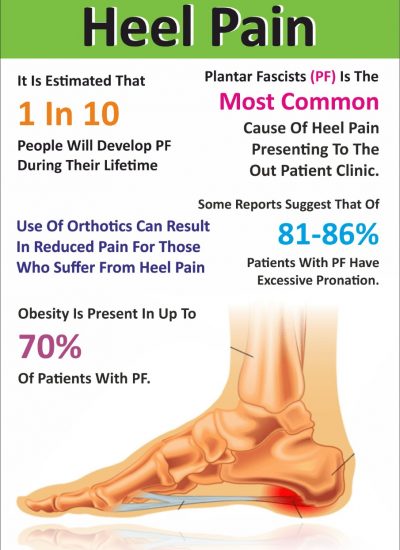
Heel pain is most often caused by plantar fasciitis, a condition that is sometimes also called heel spur syndrome. Because there are several potential causes, it is important to have heel pain properly diagnosed. A pain physician can distinguish between all the possibilities and determine the underlying source of your heel pain.
- Heel pain reasons generally fall into two main categories: pain beneath the heel and pain behind the heel. Heel pain may also be due to other causes, such as a stress fracture, tendonitis, arthritis, nerve irritation, or, rarely, a cyst.
- Plantar fasciitis: Plantar fasciitis is an inflammation of the band of tissue (the plantar fascia) that extends from the heel to the toes. In this condition, the fascia first becomes irritated and then inflamed, resulting in heel pain.
- Heel spur: When plantar fasciitis continues for a long time, a heel spur (calcium deposit) may form where the fascia tissue band connects to your heel bone. Having a heel spur may not cause pain and should usually not be operated on.
- Stone bruise: When you step on a hard object such as a rock or stone, you can bruise the fat pad on the underside of your heel. It may or may not look discolored. The pain goes away gradually with rest.
- Pain Behind the Heel: If you have pain behind your heel, this may be due to the inflammation of the area where the Achilles tendon meets the heel bone. This may happen due to too much running or wearing shoes that rub the heel too much. Such pain typically builds slowly over time, and the skin becomes thick, red, and swollen, in this process.
- Retrocalcaneal bursitis: The bursa acts as a lubricant when muscles/tendons slide over bones. Bursas exist around most large joints of the body, including the ankle. The bursa located at the back of the ankle, by the heel, is called a retrocalcaneal bursa. Repeated/excessive use of the ankle may cause the bursa to get inflamed, leading to this condition called retrocalcaneal bursitis.

- Heel pain usually develops over time and gets more severe. The afflicted area is frequently uninjured. Wearing a flat shoe may be the cause. Flat shoes can strain the plantar fascia, causing it to swell and become irritated.
The symptoms of plantar fasciitis are:
- Pain on the bottom of the heel
- Pain in the arch of the foot
- Pain that is usually worse upon arising
- Pain that increases over months
- Swelling on the bottom of the heel
Symptoms may be worst when you first get out of bed in the morning and after a period of rest during the day, but they will lessen with some movement. They may deteriorate again by the end of the day.
Consult your heel pain specialist in Pune if you experience the following-
- Difficulty in walking
- Pain in your heel and fever
- Difficulty bending the standing on tiptoe or foot downward
- Severe pain with swelling near the heel
- Pain, tingling or numbness or in the heel, and fever
You should arrange to see a heel pain specialist if:
- heel pain persists when you are not standing or walking
- heel pain continues for more than a week
At Painex, a Pain management clinic we provide the best and latest non-surgical interventions
- Medications
- Conservative approach with physical therapies
- Ergonomic evaluation and modification strategies (Footwear alteration)
- Injections – intraarticular, intralesional
- Platelet Rich Plasma Therapy
- Specific nerve blocks
- Radiofrequency ablation
- Physiotherapy & rehabilitation
- Heel pain exercise
For better heel pain relief, book your appointment with our heel pain specialist in Pune.
Our expertise in the field of pain management is over 10+ years of experience and our heel pain specialist doctor in Pune (PCMC) has treated hundreds of patients successfully.

Ankle pain is often due to an ankle sprain but can also be caused by ankle instability, arthritis, gout, tendonitis, fracture, nerve compression (tarsal tunnel syndrome), infection, and poor structural alignment of the leg or foot. Ankle pain can be associated with swelling, stiffness, redness, and warmth in the involved area. The pain is often described as an intense dull ache that occurs upon weight bearing and ankle motion.
Initial treatment may consist of rest, ice, elevation, and immobilization but may also include nonsteroidal anti-inflammatory drugs (NSAIDs), such as ibuprofen, physical therapy, and cortisone injection.
Conditions that cause heel pain generally fall into two main categories: pain beneath the heel and pain behind the heel
- Achilles Tendon Rupture
- Ankle Instability
- Ankle Arthritis
- Gout Arthritis
- Old Ankle Sprains increase the risk for newly active baby boomers
- Osteoarthritis
- PTTD
- Talar Dome Lesion
- Tarsal Tunnel Syndrome (Nerve Compression)
Initial treatment may consist of rest, ice, elevation, and immobilization but may also include nonsteroidal anti-inflammatory drugs (NSAIDs), such as ibuprofen, physical therapy, and cortisone injection.
To prevent ankle/heel pain, ensure the following:
- Perform proper warm-up before running, exercise, sports, or any other strenuous activity.
- Maintain ideal body weight
- Wear supportive footwear whenever bearing weight (for example, have supportive shoes placed near bedside to put on before taking initial steps)
Consult your ankle pain specialist in Pune if you experience the following-
- Pain and swelling come on suddenly.
- You are unable to bear weight on your ankle.
- You have a fever or the area is red or warm to the touch, which might be a symptom of infection.
- Ankle pain is intense or doesn’t go away after two to three days of at-home cure.
For better ankle pain relief, book your appointment with our ankle pain specialist in PCMC.
Medicines/Pharmacotherapy: One of the easiest techniques for pain control is using conservative care (e.g., resting the impacted part, using hot/cold packs) along with medicines, such as nonsteroidal anti-inflammatory drugs (NSAIDs) and adding a neuropathic agent.
Injections: Intralesional injections in the impacted part can provide significant pain relief in cases where medicines haven’t worked. Such interventional techniques should be followed by regular stretching and exercises for better results.
Platelet Rich Plasma (PRP) Therapy: PRP therapy involves injecting platelets from the patient’s blood to rebuild a damaged tendon or cartilage. It has been successful in not only relieving the pain but also in jumpstarting the healing process. The patient’s blood is drawn and placed in a centrifuge for 15 minutes to separate the platelets. The platelet-rich plasma is then injected into the damaged portion of the tendon or fascia.
Our expertise in the field of pain management is over 10+ years of experience and our ankle pain specialist doctor in Pune and PCMC has treated hundreds of patients successfully.
